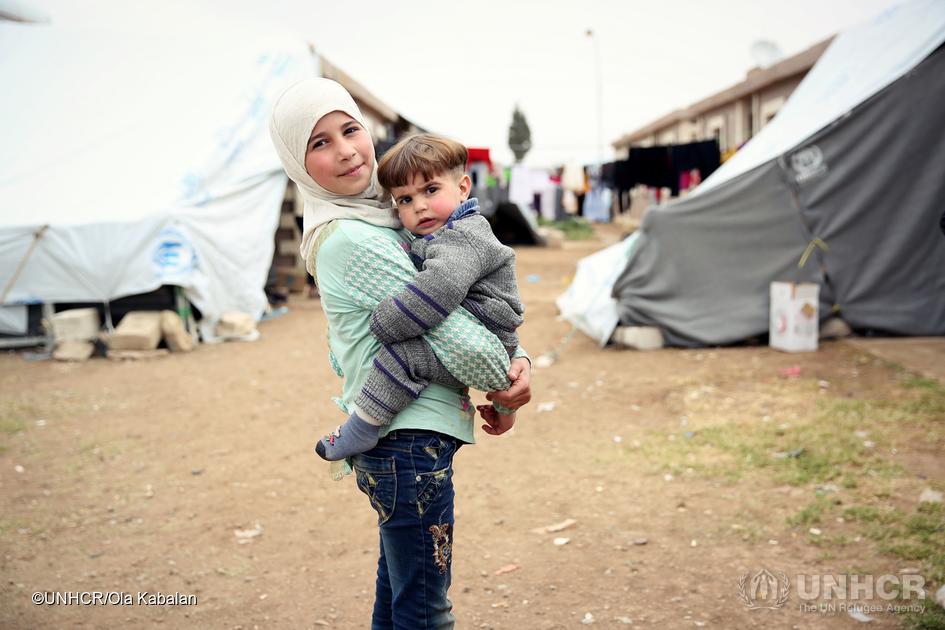Given the correct conditions and proper integration programmes, refugees can make positive and lasting contributions to their host society, economically, socially and culturally.

A young girl carries her brother through the Herjalleh shelter in rural Damascus where they are staying after fleeing fighting in Eastern Ghouta. Some 133,000 people were displaced from Eastern Ghouta by heavy fighting in March and April 2018.
World Refugee Day, 20 June, is an annual call to honour the lives, struggles and immeasurable resilience of the millions of uprooted people all over the world. Surely, it takes courage to be a refugee. Courage not to give up hope. Courage to start and build a new future against seemingly overwhelming odds. These men, women and children who have to leave behind all that is dear to them and walk away to an uncertain and often frightening future elsewhere deserve our respect, solidarity and embrace, and the opportunity to thrive once again.
Unlike migrants, refugees leave their homes and their country because they have no other choice when faced with political or religious persecution, caught up in ethnic conflict, or subjected to violence because of their gender, sexual orientation or political views. The issue of human rights is central to refugee flights. People only become refugees because one or more of their fundamental human rights are abused. Their right to seek and to enjoy asylum is firmly entrenched in international human rights law, in particular Article 14 of the Universal Declaration of Human Rights. And they have also been made the beneficiaries of an internationally endorsed protection framework under the 1951 United Nations Convention relating to the Status of Refugees and its 1967 Protocol.
Right now, as you read this, millions of people around the world have fled their homes and are waiting to begin their lives again. From Syria, Iraq, Afghanistan, Myanmar and Yemen, to South Sudan, the Democratic Republic of Congo, the Central African Republic and Nigeria, to name a few, we see unprecedented forced movements of people who are seeking safety both inside and outside their home countries. All in all more than 65 million people worldwide have lost their homes and livelihoods as a result of threats to their security arising from violent conflict, extremism and anarchic disorder. This includes some 24 million refugees – a number unprecedented since the crises of the 1990s that followed the end of the Cold War.
We, at the UN Refugee Agency (UNHCR), know from our daily work with refugees and other displaced populations that their forced displacement is not only about loss of homes and economic security. It is for many marked by deliberate victimization of women and children and a frightening array of assaults on human dignity. Rape and sexual violence are prevalent in all these conflicts, employed as strategic weapons of war to intimidate the parties to the conflict by destroying the identity, dignity and the social fabrics of families and communities. The abuse to which they are exposed is following them in flight, for example in the form of compelled early marriage in refugee camps. The trauma victimizing many refugee and displaced children will probably never be solved in their lives.
World Refugee Day is our opportunity as organisations, governments and individuals to create and strengthen welcoming communities for these refugees and asylum-seekers and ensure their protection. Beyond the legal duty by which we are bound, protection is also a core principal found across all major faiths. It lies at the heart of our very humanity: to embrace, respect and care for others, especially those in danger. As such it is our shared and collective responsibility to each do our part.
There is a lot each of us can do to overcome indifference or fear and to counter irrational suspicions and the clamour for exclusion. It is important to engage with everyone and to demonstrate that refugees and asylum-seekers are not people who are going to take anything away from us. To the contrary, they bring valuable skills and are ready to support themselves and their families by hard work if afforded the chance. Given the correct conditions and proper integration programmes, refugees can make positive and lasting contributions to their host society, economically, socially and culturally.
With tens of thousands of people being forcibly displaced every day, the need is greater now more than ever to show our solidarity. As an active citizen, this can mean holding your government accountable to its commitment to international law in providing just and humane asylum procedures and reception conditions. It can mean being the teacher who supports the children of different backgrounds to work together in her classroom. Standing with refugees can mean being the journalist who accurately reports the story that makes more people aware of the issues, lives and contributions of refugees to life in Cyprus. It can mean being a good neighbor, sharing a meal, helping a refugee child with her homework, or showing kindness to a stranger on the street. It can mean offering meaningful employment to refugees, enabling them to restore their dignity and support themselves and their families. It can mean organizing inclusive community events that celebrate diversity.
Refugees are nothing if not the greatest embodiment of the human survivor spirit. Let us then stand with them, encourage them and support them. Let us adjust our own fears and preconceptions, and be able to view refugees as equal fellow human beings, and each do our part to ensure they have the opportunities to engage fully in all aspects of community life. In doing so, we demonstrate that we stand for inclusion, respect, tolerance and diversity – the principles upon which a truly democratic society relies in order to flourish.
Μοιράσου το στο Facebook Μοιράσου το στο Twitter